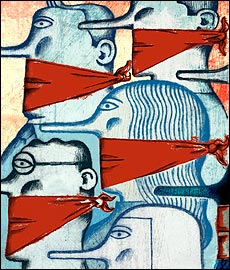|
|
Let's Be Honest
|
Corporate America has stayed silent about its corruption and scandals for too long. Speak up, and speak the truth.
 Illustration / Ferruccio Sardella |
 hen the extent of fraud committed by Wall Street investment firms was revealed in late April by the New York state attorney general, a stunned financial consultant issued this cri de coeur in The New York Times: "Is there an honest person left?"
hen the extent of fraud committed by Wall Street investment firms was revealed in late April by the New York state attorney general, a stunned financial consultant issued this cri de coeur in The New York Times: "Is there an honest person left?"
Good question. The country seems to be on something of a lying binge. The simple act of telling the truth seems unaccountably hard for a lot of people these days, even though covering the tracks of a falsehood often lands the liars in even hotter water. As suggested in the title of screenwriter William Goldman's memoir, Which Lie Did I Tell?, it's the mendacity, stupid.
Yet dishonesty, especially intellectual dishonesty, seems strangely in vogue. Bob Dylan, the onetime conscience of his generation, apparently lifted passages from a little-known book by a Japanese author and put them forward as his own lyrics on a 2001 album titled, ahem, Love and Theft, according to a story in The Wall Street Journal in early July.
Episodes of prevarication undermined some powerful institutions. The Roman Catholic Church, by appointing leaders like Archbishop Sean O'Malley of Boston, is trying to recover from revelations that church leaders had, in effect, lied to the faithful about the presence of child molesters in the priesthood.
In May, The New York Times disclosed that reporter Jayson Blair had gone on a spree of falsification and plagiarism in its pages.
The American century ended with a president who was such a compulsive truth-trimmer that he felt comfortable going on national television, clenching his fist, and insulting the nation's intelligence ("I did not have sexual relations with that woman, Miss Lewinsky"). The new century features a president who shrugs off the fact that he built a case for removing Saddam Hussein partly with evidence later found to have been false (the now-discredited intelligence reports claiming that Iraq tried to buy nuclear materials in Africa).
But the public sector seems like a paragon of honesty compared with the vaunted private sector. Remember the 1990s, when you couldn't turn on your television without seeing some puffed-up corporate executive dispensing economic wisdom on shows like CNN's Moneyline? Nowadays, America's Most Wanted seems like a more logical TV home for our business chieftains.
What a stunning fall it has been for the onetime Masters of the Universe. This has been a period to make Karl Marx shake his head in disbelief. The financial page often reads like a police log. Have corporate executives emerged as the new criminal class? The term "business ethics" has teetered toward the oxymoronic. Usually, law enforcement responds to a crime spree by imposing a curfew, but that wouldn't work, because these white-collar thieves have done their dirty work in broad daylight. Maybe it's time to start stripping those corporate logos off a few football stadiums and putting them on correctional facilities.
In May, after just three months as chairman of the Securities and Exchange Commission, William H. Donaldson remarked: "I'm surprised at the day-in and day-out steady level of malfeasance that comes in under the radar." But should Donaldson, or any of us, really be surprised? Shouldn't a proper cynic conclude that all the scandals of the past year -- insider trading, cooking the books, conflicts of interest, banking irregularities, obstruction of justice, cp9.5CEOcp10.5s using company funds to live in a style that would make Louis cp9.5XIVcp10.5 blush -- add up to nothing more than business as usual, so to speak?
This cynic doesn't think so. The tide of corruption at Enron, WorldCom, Tyco, Arthur Andersen, ImClone, et al. represents a profound breach of the social contract and persuasive evidence of a systemic, robber-baron ethos at play -- one that, if unchecked, could threaten the livelihoods and retirement dreams of millions of working stiffs. Another name for working stiffs is "voters," which is why North Carolina senator John Edwards, a Democratic candidate for president, made corporate scandals the centerpiece of a speech in Manchester, New Hampshire, on July 7. But corporate America has remained largely silent about corporate fraud. Why?
Big Business should speak up about this blemish to its reputation, because its silence is not only deafening, it's damning. As Bob Dylan once wrote, "Too much of nothing can turn a man into a liar." At least I think he wrote it.
This story ran in the Boston Globe Magazine on 8/10/2003.
© Copyright 2003 Globe Newspaper Company.
![]()
© Copyright 2003 New York Times Company |